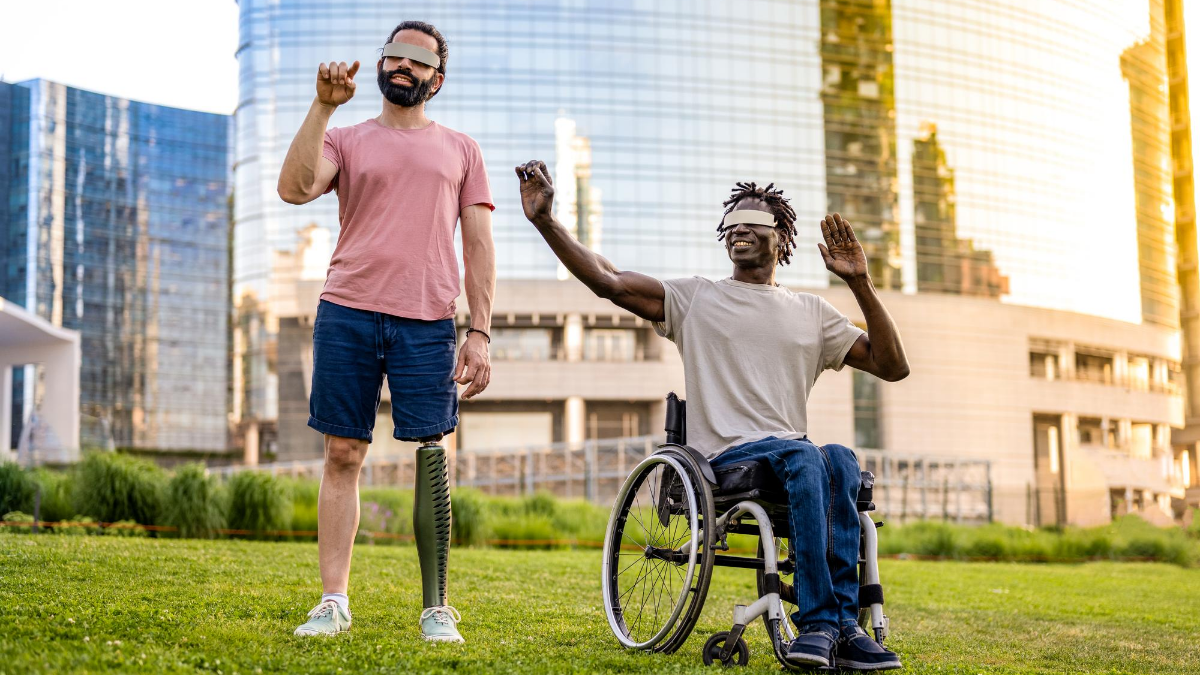[ad_1]
Brunel University has joined forces with Cambridge and Meta to explore how the Metaverse can help people with disabilities in their everyday lives.
Back when the Internet was invented in the late 1980s, it was seen as a game-changer for how we communicate and share information. Today, the Metaverse is being hailed as the next big thing that will change our lives even more.
The Metaverse, a mix of virtual reality (VR), augmented reality (AR), and 3D computer-generated environments, has the potential to give us all superpowers and make the world a more inclusive place – especially for disabled people.
Now, Brunel University has teamed up with Cambridge and Meta to explore how the Metaverse can help people with disabilities.
Social Virtual Reality
Funded by the Engineering and Physical Sciences Research Council, the million-dollar project will investigate how the Metaverse can be made accessible to people whose lives are impacted by age, illness, or disability.
The project is called “Social Virtual Reality,” and it’s meant to research how the virtual world can be more inclusive and accessible to disabled people and help them overcome problems they face in the physical world.
The researchers want to explore how the Metaverse can be used as a tool to level the playing field and give disabled people the same opportunities as everyone else.
What’s Virtual Mobility
Researchers have used the concept of “virtual mobility” to describe how new technologies can provide an easily-accessible alternative to regular activities that require a lot of mobility.
During the pandemic, for example, many people have been using video conferencing platforms to work from home or take online classes instead of going to an office or school.
The Metaverse is a perfect example of how virtual mobility can improve the lives of disabled people.
By using the Metaverse, disabled people can have the same experiences as everyone else without having to worry about the barriers that come with physical disabilities.
According to researchers from Brunel University, the Metaverse has the potential to transform the lives of disabled people by:
Social Life
Even traditional social media provides many benefits to disabled people, and the Metaverse will only amplify these effects. It can potentially help disabled people make friends, find romantic partners, and socialize without having to worry about their physical limitations.
Education
Remote learning has become more popular in recent years, but the Metaverse can take it to the next level. Immersive technologies like VR can give disabled people access to higher education, delivered engagingly without physical attendance.
Work
We, as humans, can adapt to new ways of working in a matter of days. The pandemic showed us that. Nearly 85% of people across generations see themselves performing a noticeable portion of their job in the Metaverse.
This is good news for disabled people, as they can have the same opportunities to work and earn an income, regardless of their physical abilities.
Equal Opportunities for All
The Metaverse, just like the Internet before it, has the potential to level the playing field and give everyone – regardless of their abilities – an equal opportunity to participate in society.
It can democratize opportunity and provide disabled people with the same social, economic, and educational opportunities as everyone else.
This is just the beginning of how the Metaverse can help disabled people. As technology develops, we will only see more and more ways in which it can improve their lives.
[ad_2]
Read More: nftnewstoday.com









 Bitcoin
Bitcoin  Ethereum
Ethereum  Tether
Tether  XRP
XRP  Solana
Solana  USDC
USDC  TRON
TRON  Dogecoin
Dogecoin  Lido Staked Ether
Lido Staked Ether  Cardano
Cardano  Wrapped Bitcoin
Wrapped Bitcoin  Hyperliquid
Hyperliquid  Bitcoin Cash
Bitcoin Cash  Wrapped stETH
Wrapped stETH  Sui
Sui  Chainlink
Chainlink  LEO Token
LEO Token  Stellar
Stellar  Avalanche
Avalanche  USDS
USDS  Toncoin
Toncoin  Shiba Inu
Shiba Inu  WhiteBIT Coin
WhiteBIT Coin  WETH
WETH  Litecoin
Litecoin  Wrapped eETH
Wrapped eETH  Binance Bridged USDT (BNB Smart Chain)
Binance Bridged USDT (BNB Smart Chain)  Hedera
Hedera  Monero
Monero  Bitget Token
Bitget Token  Ethena USDe
Ethena USDe  Polkadot
Polkadot  Coinbase Wrapped BTC
Coinbase Wrapped BTC  Pi Network
Pi Network  Uniswap
Uniswap  Pepe
Pepe  Aave
Aave  Dai
Dai  Ethena Staked USDe
Ethena Staked USDe  Aptos
Aptos  OKB
OKB  Bittensor
Bittensor  BlackRock USD Institutional Digital Liquidity Fund
BlackRock USD Institutional Digital Liquidity Fund  NEAR Protocol
NEAR Protocol  Jito Staked SOL
Jito Staked SOL  Internet Computer
Internet Computer  Cronos
Cronos  Ethereum Classic
Ethereum Classic  sUSDS
sUSDS